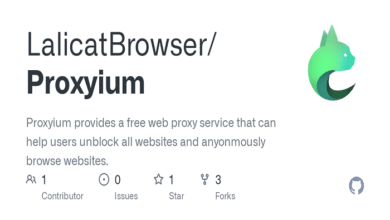Extra Proxy: Enhancing Online Security and Privacy for a Safer 2024

What is an Extra Proxy?
In an increasingly connected world, online privacy and security have become paramount. An extra proxy serves as an additional layer of anonymity and security for users navigating the internet. With cyber threats on the rise, proxies have evolved from simple tools for bypassing geo-restrictions to essential elements in online privacy strategies.
The Rise of Extra Proxy: Why Are They Gaining Popularity?
Growing Concerns Around Data Privacy
In 2024, public concern about personal data privacy continues to rise. With high-profile data breaches and increasing governmental surveillance, users are more aware of the need for protecting their online activities. Extra proxies offer a practical solution for safeguarding personal data.
Increased Cyber Threats
Cyberattacks have evolved and multiplied, making it essential for individuals and companies to adopt robust security measures. From phishing attacks to ransomware, these threats target users globally, and extra proxies can provide additional protection by masking IP addresses and encrypting traffic.
Bypassing Geo-Restrictions and Censorship
Geo-restrictions and internet censorship have become more common, prompting users to look for ways to access restricted content. Extra proxies enable users to bypass these restrictions, providing open access to information and entertainment.
How Do Extra Proxies Work? A Technical Overview
Layered Protection for Enhanced Privacy
An extra proxy works by rerouting internet traffic through multiple servers before reaching the destination. This process makes it difficult for third parties to trace the user’s activity back to their original IP address.
Encryption and Anonymity
Modern proxies offer encrypted connections, which ensure that sensitive data, such as login credentials or financial information, is protected. This level of anonymity is crucial for users operating in environments with restrictive regulations or heavy surveillance.
Load Balancing and Bandwidth Optimization
Extra proxies also serve the purpose of distributing network traffic across multiple servers, reducing the risk of overloading a single server. This load balancing improves the overall performance of the network while minimizing downtime.
The Different Types of Proxies: What Sets an Extra Proxy Apart?
Data Center Proxies vs. Residential Proxies
Data center proxies are hosted on third-party servers and offer faster performance but are more likely to be detected by websites. Residential proxies, on the other hand, are harder to detect, as they are connected to real residential IP addresses. An extra proxy combines the benefits of both types, offering a higher level of stealth and speed.
Shared Proxies vs. Dedicated Proxies
Shared proxies are used by multiple users simultaneously, making them cheaper but slower. Dedicated proxies are reserved for a single user, providing better performance and reliability. Extra proxies often fall into the dedicated category, giving users exclusive access to better performance.
Rotating Proxies and Their Role
Rotating proxies change the user’s IP address at set intervals, making it more difficult for third parties to track online activities. Extra proxies can incorporate rotating mechanisms to further enhance anonymity and security.
Top Use Cases for Extra Proxies in 2024
Web Scraping and Data Mining
One of the most common uses of extra proxies is in web scraping and data mining. By masking IP addresses, extra proxies allow users to gather large amounts of data without being blocked by websites.
Social Media Management
For businesses that manage multiple social media accounts, extra proxies provide a way to log in from different IP addresses, preventing accounts from being flagged or banned for suspicious activity.
Online Gaming and E-Commerce
Extra proxies are becoming increasingly popular in online gaming and e-commerce, where users can utilize them to bypass regional restrictions, reduce lag, and access limited-time deals.
Security Benefits of Using Extra Proxies
Protection Against DDoS Attacks
Distributed Denial of Service (DDoS) attacks are a common method of disrupting online services. Extra proxies can mitigate the impact of these attacks by distributing network traffic and preventing the overload of a single server.
Safe Access to Public Wi-Fi
Using public Wi-Fi can expose users to various security risks. An extra proxy adds a layer of protection, ensuring that the user’s data remains secure even when connected to unsecured networks.
Shielding Sensitive Information
For businesses handling sensitive information, such as financial data or intellectual property, extra proxies offer an added layer of security by hiding the true location of servers and preventing unauthorized access.
How Extra Proxies are Revolutionizing Businesses in 2024
Enhancing E-commerce Operations
E-commerce businesses often use proxies to monitor competitor pricing, ensure availability of their products across different regions, and run marketing campaigns targeting specific geolocations. An extra proxy provides faster, more reliable access to this data.
Ad Verification
Ad fraud is a major concern for businesses investing in digital marketing. By using extra proxies, companies can verify their ads’ placements and view them from different locations, ensuring they are being displayed as intended.
Competitive Intelligence
Companies can gather competitive intelligence by monitoring rivals’ online activities discreetly. Extra proxies allow for anonymous browsing and scraping of competitor websites without being detected.
Challenges and Risks Associated with Extra Proxies
As valuable as extra proxies are in safeguarding online privacy and security, they are not without their challenges and risks. Whether for individuals or businesses, it’s essential to understand the potential downsides before fully committing to using proxy services. This section delves into the ethical concerns, technical challenges related to detection, and legal implications associated with extra proxies.
Ethical Concerns: The Fine Line Between Privacy and Abuse
While the benefits of extra proxies are well-documented, their use raises ethical dilemmas, especially when individuals and organizations misuse them for unlawful or questionable activities.
Circumventing Legal Restrictions
Extra proxies, by design, are intended to provide users with anonymity and the ability to bypass geo-restrictions, firewalls, and government censorship. However, this ability to circumvent restrictions often enters murky legal and ethical territory. For example, proxies are commonly used to access content or services restricted by geography (like streaming services, websites banned in specific countries, or software not available in particular regions). While this may seem like a minor infraction, it breaches the terms of service of many companies and may even violate local laws.
Moreover, in certain countries with strict internet censorship policies, such as China, Iran, or North Korea, using extra proxies can be seen as an act of defiance against the government, which can lead to severe consequences. In these regions, circumventing government-imposed firewalls or content filters, even for innocuous reasons, is illegal, putting users at significant risk.
Facilitating Malicious Activities
Unfortunately, while many legitimate users rely on extra proxies for privacy and security, these tools can also be exploited for illicit purposes. One significant concern is their use in facilitating hacking activities. Hackers often rely on proxies to mask their location while carrying out cyberattacks or distributing malware. By bouncing their connection through several proxy servers, they make it more difficult for law enforcement to trace their actions back to the source.
Illegal web scraping is another unethical application of proxies. Web scraping, which involves harvesting data from websites without permission, is common in industries such as e-commerce or advertising. While web scraping can be used for legitimate purposes like gathering publicly available data, some use it to steal proprietary information, such as prices, product details, or personal data. Using extra proxies in these scenarios allows web scrapers to circumvent IP blocks and remain undetected for longer periods, thus making it harder for companies to protect their digital assets.
Aiding in Fraudulent Practices
Extra proxies can also be employed in fraudulent online activities, including ad fraud and identity theft. Fraudsters use proxies to mask their real identities, enabling them to run multiple fraudulent ads or impersonate users from different regions. This type of fraud costs businesses billions each year, as they pay for fake clicks or engagement on their digital advertising campaigns.
Moreover, proxies are sometimes used to evade security measures on e-commerce sites or financial institutions, allowing cybercriminals to engage in identity theft or make fraudulent transactions.
Balancing Ethical Use
The ethical use of extra proxies lies in how they are employed. Many companies and individuals use them responsibly to maintain privacy, security, and efficiency. However, the darker side of proxy use—facilitating illegal activities, hacking, and data theft—poses a considerable ethical challenge. As such, proxy providers must adopt stricter policies and protocols to ensure their services are not misused, while users need to be conscious of the laws and ethical standards surrounding their use.
Proxy Detection Systems: Staying Ahead of Advanced Technology
As the use of proxies becomes more widespread, websites and platforms are increasingly adopting sophisticated proxy detection systems. These systems aim to identify and block connections that are using proxies, creating a significant challenge for proxy providers and users alike.
Advanced Proxy Detection Techniques
Websites and service providers use various methods to detect and block proxies. One common technique is IP blacklisting, where IP addresses associated with known proxies are added to a database of blocked addresses. When a user tries to access the site through one of these blacklisted proxies, their connection is denied. Data centers that host proxies are especially susceptible to this type of detection since their IP ranges are often flagged as suspicious.
Another method involves traffic pattern analysis, where websites examine user behavior and traffic flows to determine whether the connection is coming from a proxy. For example, rotating proxies—which change the user’s IP address at regular intervals—can be detected if the website notices frequent IP address changes from the same user account or session. Similarly, browser fingerprinting can be employed to identify proxies by analyzing the user’s browser configuration, cookies, and other identifying information.
In some cases, websites implement CAPTCHAs to block proxy users. These verification systems challenge the visitor to prove they are human, as proxy services often rely on automated systems to handle multiple requests. CAPTCHAs create friction for users, leading to frustration and ultimately restricting access to the desired content.
Continuous Arms Race: Proxy Providers vs. Detection Systems
The rise of proxy detection has led to a continuous “arms race” between proxy providers and websites. Proxy providers are constantly looking for ways to bypass these detection systems, while websites are developing increasingly sophisticated methods to detect and block proxies.
For proxy providers, this means staying ahead of detection mechanisms by using residential proxies, which are much harder to detect than data center proxies. Residential proxies are associated with real home addresses, making them appear as legitimate traffic. Furthermore, some extra proxies now incorporate AI algorithms to simulate more realistic user behavior, reducing the likelihood of being flagged as proxy traffic.
However, staying ahead of detection systems requires substantial investment in technology and infrastructure, which can drive up the cost of extra proxies. For users, this also means there is no guarantee that their proxy will remain undetected forever. As detection systems continue to evolve, even the most advanced proxies can eventually be flagged.
Challenges for Users
For users relying on proxies for legitimate purposes—such as accessing region-locked content or protecting their online identity—proxy detection systems can be a major hurdle. If their proxy is detected and blocked, they may lose access to critical websites or services, creating significant disruptions to their activities. This is especially concerning for businesses that use proxies for tasks like web scraping, competitive research, or ad verification.
The challenge for users is not only staying ahead of detection systems but also navigating the fine line between legitimate use and actions that violate the terms of service of the websites they are accessing. Even if their activities are legal, if they involve proxies, they may still be denied access.
Potential Legal Issues: Understanding the Risks of Proxy Use
While extra proxies offer numerous benefits, using them can sometimes lead to legal complications, particularly when they are used to bypass geographic restrictions or engage in activities that violate terms of service agreements. The legal landscape surrounding proxies is complex, varying significantly from country to country, and users must be aware of the potential legal risks involved.
Bypassing Geo-Restrictions and Censorship
In some countries, the use of proxies is outright banned or heavily regulated. Governments that enforce strict internet censorship laws, such as those in China, Russia, and Iran, view proxies as tools for subversion. Using extra proxies to bypass firewalls or access restricted content can lead to severe legal penalties, including fines, imprisonment, or both. For instance, in China, the use of unregistered VPNs or proxies to circumvent the “Great Firewall” can result in hefty fines and legal action.
Even in countries with more liberal internet policies, using proxies to bypass geo-restrictions imposed by content providers, such as streaming services, can also have legal ramifications. While it may not be illegal in itself, it is often a breach of the terms of service, which can result in the user’s account being suspended or permanently banned. In some cases, service providers may also pursue legal action against users who repeatedly violate these terms.
Proxies in Countries with Data Retention Laws
In countries where strict data retention laws are in place, using a proxy to mask one’s identity can be seen as an attempt to evade government surveillance. This is especially true in countries that require ISPs to retain user data for a certain period. Proxy use in such regions can be seen as a violation of these regulations, potentially leading to fines or other penalties.
Moreover, in the European Union, proxies can intersect with the General Data Protection Regulation (GDPR). GDPR places strict requirements on how personal data is collected, stored, and processed. While proxies can help mask personal data, they may also violate GDPR if they are used to gather data on EU citizens without their explicit consent, such as in the case of web scraping for competitive research.
Business Implications: Legal Risks for Companies
For businesses, the legal risks of using proxies are equally significant. Companies that use extra proxies for tasks such as competitive intelligence or ad verification must ensure they are not violating any laws or terms of service. In some industries, scraping data from competitors’ websites, even if publicly available, may be considered a violation of intellectual property rights or anti-competitive behavior, leading to potential lawsuits.
Additionally, businesses must ensure that their use of proxies complies with local and international regulations on data privacy, such as GDPR or the California Consumer Privacy Act (CCPA). Failure to comply with these regulations can result in significant legal liabilities, including fines, lawsuits, and reputational damage.
Emerging Trends and Future Developments in Extra Proxies
AI-Driven Proxy Solutions
As AI technology continues to evolve, we are likely to see the integration of AI into proxy services. AI-driven proxies could offer smarter, more adaptive solutions that automatically adjust settings based on the user’s needs and online behavior.
Blockchain-Powered Proxies
Blockchain technology is starting to be used in developing decentralized proxy networks. These blockchain-powered proxies could provide an even higher level of security and anonymity, as they are not reliant on centralized servers.
Integration with VPNs
While proxies and VPNs serve similar purposes, they are different technologies. However, we are starting to see more integration between the two, with extra proxies offering VPN-like features for enhanced encryption and privacy.
How to Choose the Right Extra Proxy Provider in 2024
Factors to Consider
Choosing the right extra proxy provider depends on several factors, including speed, reliability, and security. Users should also consider whether they need a dedicated or shared proxy, as well as the geographic locations of the available IP addresses.
Pricing and Performance
Extra proxies typically come at a higher price than standard proxies, but they also offer superior performance. Users should weigh the cost against the benefits, especially if they require a proxy for business purposes.
Customer Support and Service Level Agreements
Reliable customer support is crucial when selecting an extra proxy provider, especially for businesses that rely on proxies for critical operations. Users should look for providers that offer 24/7 support and clear service level agreements.
Conclusion: Why Extra Proxies Are Essential in 2024
As the digital landscape becomes more complex and cyber threats more advanced, the need for enhanced privacy and security solutions is more critical than ever. Extra proxies offer a valuable tool for individuals and businesses alike, helping to protect sensitive data, bypass restrictions, and stay anonymous online. With continuous advancements in technology, extra proxies will likely play an even more significant role in the future of internet security.





